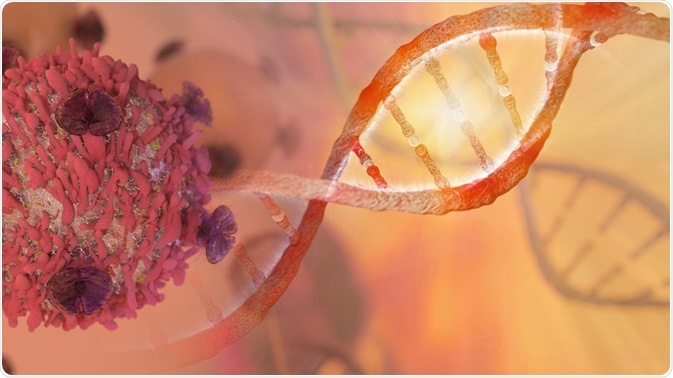Lung cancer is a disease involving the uncontrolled multiplication and growth of cells in the lung tissue caused by changes in certain genes in the body. In some cases, these genetic mutations may be inherited from a family member with the disease, although most patients with lung cancer develop a genetic mutation due to environmental exposure to carcinogens.

Image Credit: CI Photos / Shutterstock.com
The two most common genetic mutations that are linked to lung cancer, EGFR and KRAS, are discussed in more detail below, in addition to several other genes that may also play a role in the pathogenesis of lung cancer.
Somatic and inherited gene mutations
Somatic mutations refer to genetic changes that are acquired throughout a person’s lifetime and are not inherited at birth. This includes changes caused by environmental factors, such as damage caused by exposure to cigarette smoke.
If a genetic mutation is inherited from a parent who is affected by the disease, it is thought to follow an autosomal dominant inheritance pattern. This means that only one parent needs to carry a genetic mutation, as one copy of the gene is sufficient to increase their risk of the disease.
It is worth noting, however, that not all individuals who inherit a gene mutation for lung cancer will suffer from the disease. This is thought to be due to related environmental factors that affect the pathogenesis of the disease.
Epidermal growth factor receptor
Epidermal growth factor receptor (EGFR) is a key gene in the pathology of lung cancer and is present in up to half of all cases. EGFR is involved in the production of a receptor protein, which becomes embedded into the cell membrane and regulates signaling pathways of cell growth and proliferation.
A mutation in the EGFR gene can alter the proteins that are produced, thus leading to constant activation of the signaling pathways and uncontrolled growth of the cells.
EGFR is a suitable target in the treatment of the disease. In fact, there are several drugs that manipulate its action in the production of proteins and resulting effects, including gefitinib, erlotinib, and cetuximab.
Kirsten rat sarcoma viral oncogene homolog (KRAS)
Similar to the EFGR gene mutation, KRAS is a guanosine triphosphatase (GTPase) enzyme that is involved in a high proportion of lung cancer cases. Its role is to produce the K-Ras protein, which regulates the division of cells via the RAS/MAPK pathway.
When there is a mutation in the KRAS gene, the division of cells can occur in an uncontrolled manner and lead to the formation of a tumor and the pathogenesis of lung cancer.
Understanding mutations in lung cancer
Other gene mutations
There are several other genes that have also been associated with the pathogenesis of lung cancer. Specifically, mutations in the following genes may be involved in causing the disease:
- MET
- LKB1
- BRAF
- PIK3CA
- ALK
- RET
- ROS1
Each of these genes plays a role in the regulation of cell growth and proliferation in the lung tissue. It is for this reason that a mutation in one of these genes can lead to abnormal growth of the cells and the possible presentation of cancerous tissue.
References
Further Reading
Last Updated: May 23, 2021